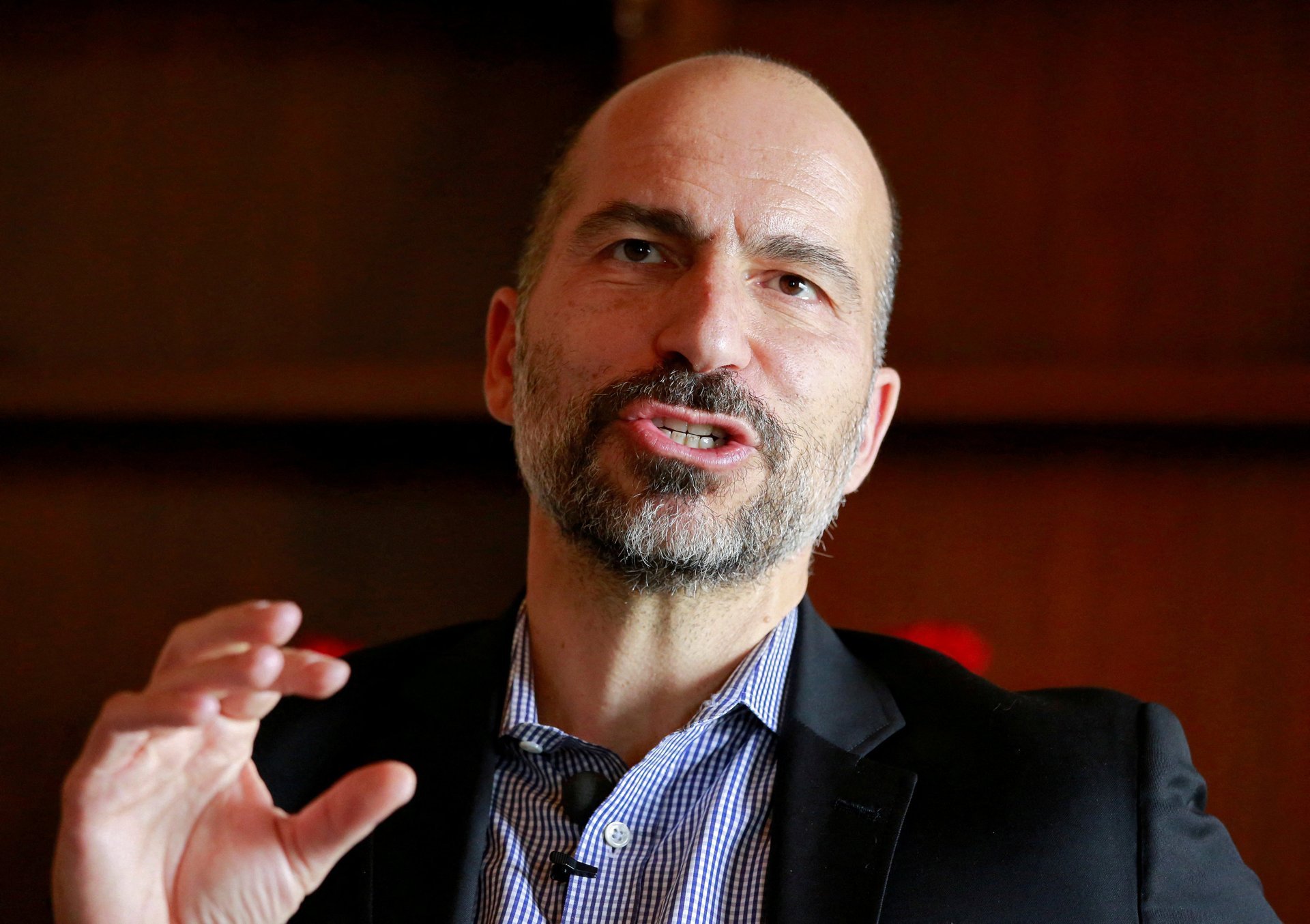The Memo: Weighty words
Uber CEO Dara Khosrowshahi sent his staff a Sunday-night email this week, setting expectations for a change toward corporate austerity measures at the ride-hailing and delivery app, just days after an earnings call where Uber’s performance beat analysts’ estimates (though the total picture was a mixed bag).


Uber CEO Dara Khosrowshahi sent his staff a Sunday-night email this week, setting expectations for a change toward corporate austerity measures at the ride-hailing and delivery app, just days after an earnings call where Uber’s performance beat analysts’ estimates (though the total picture was a mixed bag).
In the memo, first reported by CNBC, Khosrowshahi explains that he has just wrapped up a series of discussions with investors in New York and Boston. Although media reports suggest that investors hold mixed opinions about where the tech market is going, Khosrowshahi’s conversations and his subsequent memo were colored by pessimistic forecasts.
Here are a few of the words and phrases that jump out as particularly telling and may even point to a wider vibe shift in Silicon Valley and beyond:
Privilege
“We will treat hiring as a privilege and be deliberate about when and where we add headcount.”
Cutting way back (or perhaps freezing?) hiring will be one way Uber is going to cut costs going forward. Layoffs are not explicitly announced in the memo, but they’re becoming more common in the sector.
“Privilege” arguably does some specific work here. Khosrowshahi seems to be plugging into the zeitgeist and, whether intentionally or not, reminding highly-paid employees whose workloads are going to become a lot more intense—the email refers to doing “more with less”—that they’re already in a far more comfortable position than most workers.
Hustle
“I’ve never been more certain that we will win. But it’s going to demand the best of our DNA: hustle, grit, and category-defining innovation.”
The H-word is a throwback to the mid 2010s, when Uber’s founder and former CEO, Travis Kalanick, personified the most questionable traits of hustle culture—a tendency toward rudeness and arrogance and a push for profits at all costs.
“Hustle” lost a lot of its shine before the pandemic, just as a host of brash CEOs were replaced by gentler, less showy chief executives. Young workers began talking more openly about burnout and found ways to collectively push back against companies that violated ethical boundaries. Then the pandemic hit, and the conversation about work became further saturated with words like compassion, as well as people-first policies, and empathetic management.
Here, Khosrowshahi seems to be suggesting that although the pandemic isn’t over, an unofficial grace period for employees might be.
Hardcore
“We will be even more hardcore about costs across the board.”
Although “hardcore,” can connote dedication and intensity that’s admirable, there’s a whiff of toxic masculinity about the word. In a corporate setting, a narcissistic CEO who plans to lead command-and-control style might want to be “hardcore,” rather than be humble and open-minded. Khosrowshahi is trying to thread a needle here: bringing a badass spin to financial discipline without inviting back the most aggressive parts of Uber’s culture.
30
“The average employee at Uber is barely over 30, which means you’ve spent your career in a long and unprecedented bull run. This next period will be different, and it will require a different approach.”
Striking a paternal tone, the 52-year-old Khosrowshahi speaks directly to his many employees who were only teenagers when the 2008 financial crisis upended careers and left millions unemployed, and were playing with Hot Wheels during the first dot-com crash.
While the rest of the email shouts “tough times ahead,” Khosrowshahi chooses the less alarming “different” to describe what young workers should imagine for the future. Different doesn’t always mean worse, but it rarely means better.
Free Cash Flow
“Now it’s about free cash flow. We can (and should) get there fast.”
Khosrowshahi announces a quick, meaningful pivot for a company once valued at over $100 billion (its current market cap is $46 billion) although it has never been cash-flow positive. For years, companies like Uber have been valued based on their growth potential rather than their profitability. That ride is over. —Lila MacLellan, senior reporter
Five things we’re reading this week
💌 A free matchmaking perk helps one Indian tech company attract and retain employees. Sri Mookambika Infosolutions partially credits the sweet benefit for keeping its attrition rate below 10% for years.
💩 How good are you at detecting bullshit? This fun quiz will test your ability to rank corporate bullshit from “least” to “most” bullshit. (And yes, bullshit is the technical term.)
🛌🏿 Unpredictable hybrid work models are failing women. Caregiving duties still fall disproportionately on women, and predictability is what caregivers need most.
📉 Boards are appointing fewer CEOs as directors. Companies are now selecting more first-time board members, in recognition of the need for diverse perspectives.
😷 Nation leaders (and companies) should start preparing for the next pandemic. The threat will likely come from a pathogen we’re already familiar with.
Quartz obsession interlude

Counting chickens before they hatch. How many kids does it take to perpetuate a population? The answer lies in what’s known as the replacement rate. 🎧 Learn more with this week’s episode of the Quartz Obsession podcast.
Listen on: Apple Podcasts | Spotify | Google | Stitcher
30-second case study
In an open letter to Apple’s executive team last week, workers accused the company of creating a hybrid plan driven by fear. “Fear of the future of work, fear of worker autonomy, fear of losing control.” they wrote.
The problem is that Apple’s company policy requires employees to come to its global offices three specific days a week, on Mondays, Tuesdays, and Thursdays, starting May 23. “Three fixed days in the office and the two WFH days, broken apart by an office day, is almost no flexibility at all,” the letter claims.
Indeed, researchers tend to side with Apple employees on the matter.
“I would call this a rigid hybrid model,” and that’s problematic, says Raj Choudhury, an associate professor at Harvard Business School who studies the future of work. Rigid hybrid policies are “not cognizant that people’s lives have different priorities,” Choudhury says. Everything from child care to hobbies, appointments, and a particular team’s workflow may figure into which days of the week make the most sense to work from home.
Moreover, one of the most appealing parts of a remote-work option is that it gives employees the ability to work from anywhere at least part of the time. But “if you have to go to the office every week, there’s no way you can live 200 miles away,” Choudhury notes. More flexible policies, like the one that Airbnb announced last week, may still require employees to get together regularly for in-person meetups, but not with such frequency that workers have to live in commuting distance of an office location.
The open letter also expresses dismay at the company’s decision to designate Wednesday and Friday as remote days, rather than having a string of consecutive in-office days followed by consecutive remote days. Most surveys and research find that Mondays and Fridays are the most popular days to work remotely. That’s not because workers want three-day weekends, but simply the freedom to travel and work on Fridays and Mondays.
The takeaway: Apple says its hybrid work policy is meant to be “both collaborative and flexible.” It’s neither.
Choudhury suspects that Apple and other similarly inflexible companies will see high levels of attrition if they don’t adjust their policies. Ideally, they say, in-office and remote-work days should be determined by managers after consulting with their direct reports.
That’s pretty much what Apple employees’ latest letter is asking for. One line stated: “Stop treating us like school kids who need to be told when to be where and what homework to do.”
You got The Memo!
Today’s Memo was written by Lila MacLellan and Sarah Todd and was edited by Francesca Donner. The Quartz at Work team can be reached at [email protected].
Did someone forward you this email? Sign up for future installments here. Get the most out of Quartz by downloading our app and becoming a member.